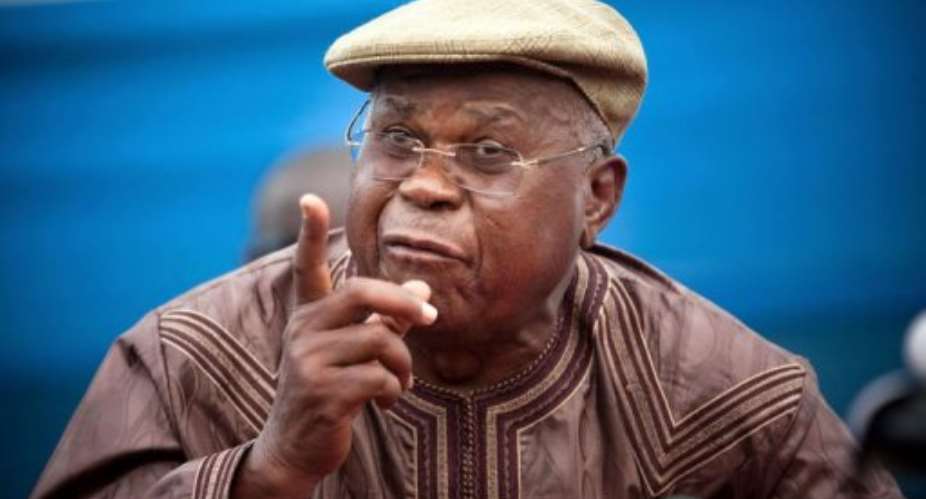KINSHASA (AFP) - At 78, Etienne Tshisekedi wa Mulumba, a strong-willed opposition leader and critic of former dictator Mobutu Sese Seko, is likely making his last bid at power in the Democratic Republic of Congo.
Since returning home in December 2010 after three years abroad for medical treatment, the veteran politician has picked up where he left off, as an indefatigable critic of the regime.
He refused to sign the candidates' code of conduct for Monday's elections, and called supporters to break their fellow "fighters" out of prison if they were not released after being arrested during protests.
He has even declared himself president, saying: "The ruler in this country is the Congolese people, who have long proclaimed me as (president)."
A popular figure, he can gather tens of thousands of supporters in blistering heat for campaign rallies.
But his unbending personality likely ruined any chance of uniting the country's fragmented opposition, giving incumbent Joseph Kabila a big edge over the 10 other candidates contesting the single-round presidential vote.
Nicknamed by supporters the "Sphinx of Limete" -- the Kinshasa neighbourhood where he lives -- Tshisekedi has broad, slightly hunched shoulders and a thin smile that makes rare appearances on his round face.
Born December 14, 1932 in Kasai Occidental province -- his hometown of Kananga was called Luluabourg in what was then the Belgian Congo -- Tshisekedi received the newly independent country's first doctorate in law at age 29.
He was still a student when a young army colonel, Joseph-Desire Mobutu, seized power and declared prime minister Patrice Lumumba and president Joseph Kasa-Vubu "neutralised".
Tshisekedi was named to the "college of commissioners" that Mobutu designated to run the government, and in January 1961 signed an arrest warrant for Lumumba, who was assassinated after being taken into custody.
After Mobutu staged a second coup in November 1965, Tshisekedi served as interior, justice and planning minister, and was the first secretary of the Popular Movement of the Revolution (MPR), Mobutu's party.
He became a member of parliament in 1970, but broke with Mobutu a decade later, when he and 12 other lawmakers wrote an open letter denouncing the kleptocratic leader's corrupt and predatory rule.
He was sent to prison and released in 1982, the year he co-founded the Union for Democracy and Social Progress (UDPS) -- which became the chief opposition after Mobutu reluctantly lifted his ban on political parties in 1990.
Pushing for a democratic transition from the Mobutu regime, Tshisekedi was elected prime minister in August 1992, but Mobutu fired him seven months later.
In 1997, after Mobutu was ousted in a rebellion led by Kabila's father, Laurent, Tshisekedi quickly became an opponent of the new regime -- a stance that continued after Laurent's assassination in 2001 and his son's rise to power.
He signed the peace deal ending the 1998-2003 war that followed Mobutu's ouster, but refused to take part in Kabila's transitional government.
He boycotted the 2006 elections, the country's first democratic vote in more than 40 years, leveling accusations of fraud.
But he says his days as perennial opposition leader are over.
"Every day of my life I've dreamt of becoming president of the republic," he said in a July interview. "Now the moment has come for that dream to become a reality."





 Let’s be true believers, not just church goers – Catholic Priest to Christians
Let’s be true believers, not just church goers – Catholic Priest to Christians
 Ejisu by-election: "We don’t need an independent candidate" — Akufo-Addo fights ...
Ejisu by-election: "We don’t need an independent candidate" — Akufo-Addo fights ...
 Election 2024: Bawumia dares Mahama to two-man debate as he starts countrywide t...
Election 2024: Bawumia dares Mahama to two-man debate as he starts countrywide t...
 'Borla' BVDs: 'Why would anyone want to buy 10 used biometric devices 'hard-code...
'Borla' BVDs: 'Why would anyone want to buy 10 used biometric devices 'hard-code...
 Professor Jane Naana pays last respect to Modestus Ahiable
Professor Jane Naana pays last respect to Modestus Ahiable
 IT is a major skill needed for the job market - Industry Players
IT is a major skill needed for the job market - Industry Players
 Nungua Traditional Council performs “Jenten Nishwamo” ahead of Homowo
Nungua Traditional Council performs “Jenten Nishwamo” ahead of Homowo
 Tema residents demand end of dumsor
Tema residents demand end of dumsor
 A vote for Owusu Aduomi is a vote gor NDC – Bawumia tells Ejisu residents
A vote for Owusu Aduomi is a vote gor NDC – Bawumia tells Ejisu residents
 S. Africa's ex-president Zuma makes surprise comeback
S. Africa's ex-president Zuma makes surprise comeback
